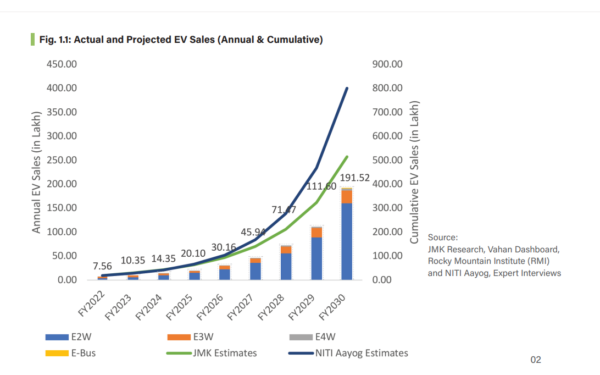India may only reach 50 million electric vehicle (EV) sales by 2030, falling behind by 40% on the sales projections by the Government of India’s think tank NITI Aayog, according to a new report by JMK Research and Climate Trends.
The report authors project the sales shortfall after accounting for the current electric mobility policies (FAME II and state policies) and even increased EV adoption in a few years as battery prices drop and local manufacturing ramps up.
NITI Aayog had projected EVs to supply 30% of new private car sales in India, 70% of commercial cars, 40% of buses, and 80% of two and three-wheelers by 2030, driven by FAME II and other measures. In absolute numbers, this amounts to having 80 million electric vehicles on road by 2030.

The JMK report projects electric two-wheelers (E2Ws) will grow at 57.86% annually between FY 2022 and FY 2030 and account for 79% of the total EV sales in the analysis period.
Compared to E2Ws, the report adds that the higher costs of E3Ws are a concern for their owners with low disposable incomes. This could lead to E3Ws’ low adoption rate in the coming years.
The report projects a modest growth in E4W sales till FY 2025 owing to charging infrastructure still being built up and most of the current product introductions primarily in the premium segment. After FY 2026, the market is expected to grow annually at 52% given the anticipated launch of mass segment e-cars, adoption of an increased number of E4Ws for fleet, and private charge point operators and e-car OEMs taking the lead in setting up semi-public charging stations.
E-buses will witness high growth due to an increase in the number of tenders issued by the government and the private sector also entering the E-bus domain.
The analysis further estimates India will need at least 2.05 million and 3.9 million charging stations to support 50 million and 80 million EVs on road by 2030, respectively. This is much higher than the charging stations planned in this period.
The study “Accelerating transport electrification in India by 2030” was released at the EV Market Conclave organized by JMK Research in New Delhi. It also analyses all approved state EV policies and makes a strong case for better and more ambitious state targets to complement India’s sales projections.
While some states have defined targets as absolute numbers, others have defined a percentage of total vehicles, and some have no target defined at all. Very few policies define targets for charging infrastructure or to convert government-owned vehicle fleets to EVs. Moreover, the majority of the policies do not have timelines till 2030. They currently only provide support till 2022 to 2026.
“Progress on clean energy goals, for example, renewable energy, happened as much due to state policies as it did due to regulation. In electric mobility as well, the country needs much more coordination. India has started on the right foot on e-mobility, with an enabling policy landscape and sales growing rapidly in some vehicle segments,” said Aarti Khosla, Director, Climate Trends. “However, we need more coordinated efforts between states and centre, in defining targets and incentives that align with national ambition and policies, not to miss much greater focus on charging infrastructure and financial solutions for funding EVs.”
“To bridge the 40% gap in realizing projected sales by 2030, India can put simple yet effective practices in place. All states must define clear targets for ramping up charging infrastructure, incentives alone are not enough. This is a prerequisite that will define adoption trends in the country. Following global examples, India should consider introducing mandates for 100% electrification of government fleets, and mandating at least some percentage of vehicle aggregator fleets to be electric,” said Jyoti Gulia, founder and CEO, JMK Research & Analysis.
This content is protected by copyright and may not be reused. If you want to cooperate with us and would like to reuse some of our content, please contact: editors@pv-magazine.com.









4 comments
By submitting this form you agree to pv magazine using your data for the purposes of publishing your comment.
Your personal data will only be disclosed or otherwise transmitted to third parties for the purposes of spam filtering or if this is necessary for technical maintenance of the website. Any other transfer to third parties will not take place unless this is justified on the basis of applicable data protection regulations or if pv magazine is legally obliged to do so.
You may revoke this consent at any time with effect for the future, in which case your personal data will be deleted immediately. Otherwise, your data will be deleted if pv magazine has processed your request or the purpose of data storage is fulfilled.
Further information on data privacy can be found in our Data Protection Policy.